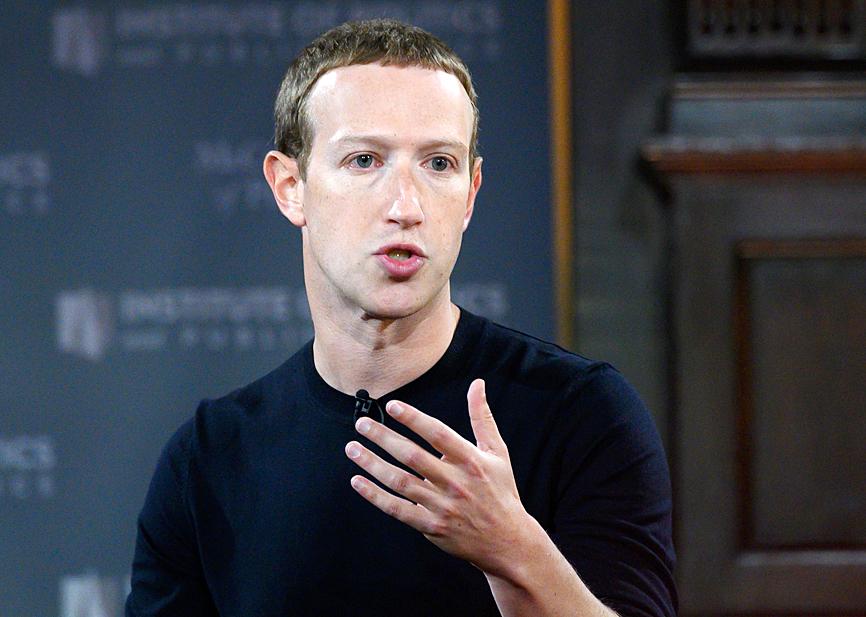Facebook Inc CEO Mark Zuckerberg’s net worth passed US$100 billion for the first time on Thursday after the US company hit a record high on optimism about the release of its TikTok competitor Reels.
The 36-year-old joins fellow tech titans Jeff Bezos and Bill Gates as the only people in the world who currently have centibillionaire status, according to the Bloomberg Billionaires Index. Zuckerberg’s fortune is largely derived from his 13 percent stake in Facebook.
The founders of the US’ largest technology companies have enjoyed a mind-boggling accumulation of wealth this year as the COVID-19 pandemic drives more people online, despite the US economy contracting at its fastest pace on record. Zuckerberg has gained about US$22 billion this year, while Bezos is up more than US$75 billion.

Photo: AFP
The staggering numbers have put Big Tech under increased scrutiny, with Zuckerberg, Bezos, Apple Inc CEO Tim Cook and Alphabet Inc CEO Sundar Pichai testifying before the US Congress last month to defend allegations that their power and influence are out of control.
The five largest US tech companies — Apple, Amazon.com Inc, Alphabet, Facebook and Microsoft Corp — currently have market valuations equivalent to about 30 percent of US gross domestic product, nearly double what they were at the end of 2018.
US Senator Bernie Sanders, meanwhile, plans to introduce legislation to tax what he called “obscene wealth gains” during the coronavirus crisis. The “Make Billionaires Pay Act” would tax 60 percent of the increase in the ultrawealthy’s net worth from March 18 through the end of the year and use the revenue to cover out-of-pocket healthcare expenses of all Americans.
Zuckerberg, who founded the social media giant from his Harvard University dorm room in 2004, has said he plans to give away 99 percent of his Facebook shares over his lifetime.
In related news, Facebook said it would allow employees to work from home until July next year due to the pandemic and would give them US$1,000 for home office needs, a company spokeswoman said on Thursday.
The company joins other big technology firms that have taken similar steps recently.
Late last month, Alphabet said it would allow employees who do not need to be in the office to work from home until the end of June next year, while Twitter Inc had proposed remote work indefinitely for some of its employees.
Facebook added that the company would continue reopening offices in a restricted capacity where government guidance permits and where virus mitigation has taken place for about two months.
Additional reporting by Reuters

To many, Tatu City on the outskirts of Nairobi looks like a success. The first city entirely built by a private company to be operational in east Africa, with about 25,000 people living and working there, it accounts for about two-thirds of all foreign investment in Kenya. Its low-tax status has attracted more than 100 businesses including Heineken, coffee brand Dormans, and the biggest call-center and cold-chain transport firms in the region. However, to some local politicians, Tatu City has looked more like a target for extortion. A parade of governors have demanded land worth millions of dollars in exchange

Hong Kong authorities ramped up sales of the local dollar as the greenback’s slide threatened the foreign-exchange peg. The Hong Kong Monetary Authority (HKMA) sold a record HK$60.5 billion (US$7.8 billion) of the city’s currency, according to an alert sent on its Bloomberg page yesterday in Asia, after it tested the upper end of its trading band. That added to the HK$56.1 billion of sales versus the greenback since Friday. The rapid intervention signals efforts from the city’s authorities to limit the local currency’s moves within its HK$7.75 to HK$7.85 per US dollar trading band. Heavy sales of the local dollar by

Taiwan Semiconductor Manufacturing Co’s (TSMC, 台積電) revenue jumped 48 percent last month, underscoring how electronics firms scrambled to acquire essential components before global tariffs took effect. The main chipmaker for Apple Inc and Nvidia Corp reported monthly sales of NT$349.6 billion (US$11.6 billion). That compares with the average analysts’ estimate for a 38 percent rise in second-quarter revenue. US President Donald Trump’s trade war is prompting economists to retool GDP forecasts worldwide, casting doubt over the outlook for everything from iPhone demand to computing and datacenter construction. However, TSMC — a barometer for global tech spending given its central role in the

The Financial Supervisory Commission (FSC) yesterday met with some of the nation’s largest insurance companies as a skyrocketing New Taiwan dollar piles pressure on their hundreds of billions of dollars in US bond investments. The commission has asked some life insurance firms, among the biggest Asian holders of US debt, to discuss how the rapidly strengthening NT dollar has impacted their operations, people familiar with the matter said. The meeting took place as the NT dollar jumped as much as 5 percent yesterday, its biggest intraday gain in more than three decades. The local currency surged as exporters rushed to